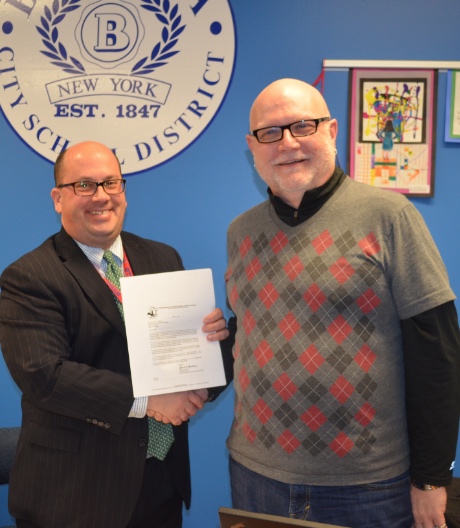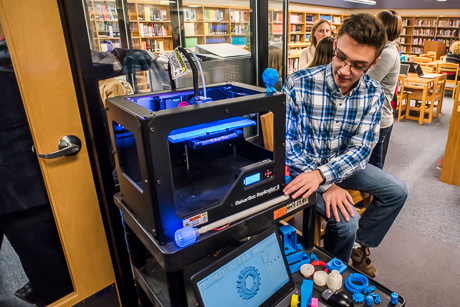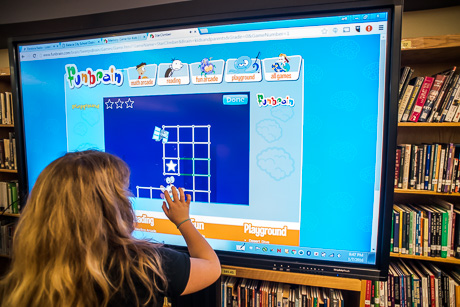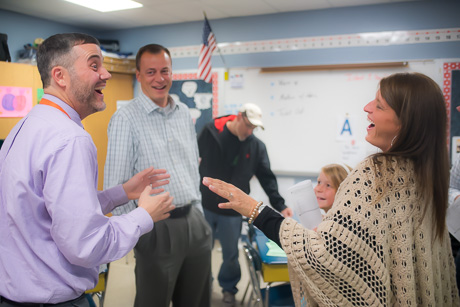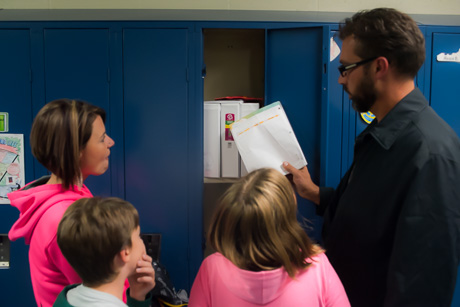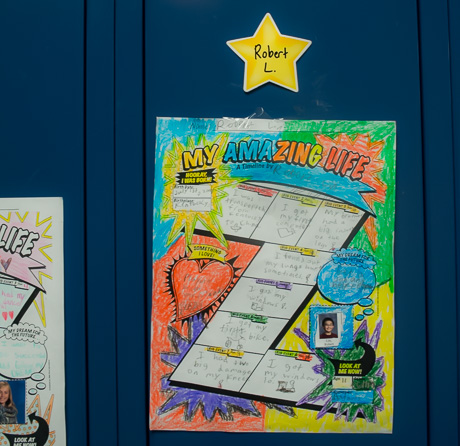To Opt Out or Not? That is the Question
by Gretchen DiFante - posting as a parent of students impacted by the assessments.
Some of the Batavia City School District students will take New York State tests beginning this Tuesday. Many others are exercising their right to opt out of these tests.
My husband and I have watched our children take these state exams since our eldest was in elementary school (she’s now 22 years old); however up until this year, we’ve never seen any of our five children exhibit any unusual stress or anxiety over these tests. This year is different, and in the past two weeks our fourth grader’s anxiety over taking the tests has escalated daily. Discussion of the topic between my eighth grader, her classmates and us, her parents, has recently dominated our family conversations.
Our district teachers had an evaluation system tied to several new items last year, including observations, and they performed very well as did teachers state wide. Then the governor basically said something like, “teachers performed too well, and they really can’t be that good, so let’s make the evaluation system more difficult (and more ludicrous).” Please tell me in what other industry in the world does that happen? The position in which the governor is willing to put our teachers is, in my opinion, unforgiveable. We have phenomenal teachers in our district and in the state. I’m not saying that because I’m a school board member. Being a school board member just makes me feel more protective of our teachers, but my opinion is based on having five children who have either graduated from or are currently being educated in this district. My children have had outstanding teachers, coaches and administrators who have taught them life lessons way beyond the “basics.” They have demonstrated outstanding leadership skills, been there to lift our kids up when they’ve struggled, spent extra time with them when they’ve realized untapped potential that needed fueling, worked side by side with my husband and me as we faced some very difficult challenges and even cried tears with us at moments of crisis.
One of the best overviews I’ve read regarding the recent education bill and its impact on our teachers is written by Valerie Strauss and entitled, What the ‘thoughtless NY government just did to teachers,’ published in the Washington Post on April 3. The reader can access that article at this link: http://www.washingtonpost.com/blogs/answer-sheet/wp/2015/04/03/what-the-thoughtless-n-y-government-just-did-to-teachers/
From our children’s friends and in countless social media posts I read, there seem to be two main reasons for opting out of the upcoming tests: they are afraid their teachers will be unfairly judged if they perform poorly on the tests and they “hate” (or fill in the blank with similar words) Common Core.
The nation’s governors and education commissioners, through their representative organizations, the National Governors Association Center for Best Practices (NGA) and the Council of Chief State School Officers (CCSSO), developed Common Core. Teachers, parents, school administrators, and experts from across the country, together with state leaders, provided input into Common Core standards. The design for the Common Core standards was based on scholarly research, surveys on the skills required of students entering college and workforce training programs, assessment data identifying college and career-ready performance, comparisons to standards from high-performing states and nations, National Assessment of Educational Progress frameworks in reading and writing for English language arts, and findings from Trends in International Mathematics and Science and other studies which concluded the traditional mathematics curriculum (the way my generation learned, paying attention parents?), must become substantially more coherent and focused in order to improve student achievement.
All that research and wisdom, and we seem to have a significant number of people in this country who know more about educational needs than this body of research shows and this group of experts believes.
Responsible interpretation of research requires critical questioning and strategic thinking and an objective perspective. Ironically, the exact skills Common Core is designed to reinforce; but you see, I didn’t grow up in an educational system designed to teach those skills. I was, however, lucky to be the daughter of teachers who instilled those skills in opportunities outside the classroom.
I was horrible at math. Linear equations still make me nervous. As a young adult, the field I wanted to enter required lots of math; and because I saw myself as inadequate and, yes, too stupid, to master the math, I never pursued that path. Our first three kids were educated prior to Common Core, and I could rarely understand their math past Middle School. Common Core came, and I scratched my head at some of our daughter’s third grade math. But something weird happened; my husband, a former civil engineer, who had always understood our kids’ math, was struggling to understand some of the basic math principles as well. We did research on Common Core and found that the math curricula were designed to teach fewer concepts but to dive very deeply into those concepts and to teach them from the linear, visual and language-based perspectives. I had heard opponents criticize Common Core as catering to one single type of learner. Then a really odd thing happened in the DiFante house earlier this year, my husband was helping our fourth grader with her math and said, “I don’t understand this at all, maybe your Mom can help you,” to which our daughter responded with, “Yeah, right Dad.”
I looked at the math problem and didn’t see a problem at all. Instead I saw a very logical story, and I immediately knew how to arrive at the answer – it was math without numbers – a dream come true! What I learned is that the Common Core Math Standards require students to learn multiple ways to solve problems and explain how they got their answers. The standards and resulting curricula are designed so the linear learners like my husband and verbal learners like me and visual learners as well have unprejudiced opportunity to build three different yet equally important logical approaches to mathematics. I hope the reader can truly grasp how exciting that is! Our childrens’ brains are getting trained a different way; and it is because of this that our children will be better strategic thinkers and able to make better decisions by virtue of a more robust and disciplined thought process than our brains were trained to undergo.
I know this change is painful for parents; we all feel inadequate and protective at the same time; however, we need to move forward for the sake of our children. Progress is good and needed. If, like many, you thought the previous educational approach in our schools was good enough and not in need of fixing, consider the huge body of evidence showing that two-thirds of American college students attending four-year colleges fail to earn their degrees within six years and estimating the cost of 1.7 million students nationwide in remedial college classes at $3 billion a year. Remedial coursework makes taxpayers pay twice -- once for students to learn in high school, and again in college.
A 2011 national survey by the ACT, showed four out of five students in college remediation had high school GPAs above a 3.0!
If you are still a disbeliever, ask anyone on the faculty or in administration at Genesee Community College to tell you about the changes they have witnessed in the remedial needs of incoming freshman.
Lest readers think it’s only college-bound students who need changes, please have a conversation with any employer in this county who is in charge of hiring employees in any industry from the manufacturing floor to the board room and listen to them describe the challenges inherent in the available pool of candidates.
Regarding the tests beginning this Wednesday, the Batavia School District’s official opinion regarding opting out is stated in the four points listen below:
1. We are a Focus District, and if we do not make our participation rate of 95% on the exams, we potentially could lose more local control for our district. Two or more years of not making it could lead to us being a Priority District which would have even worse ramifications than being a Focus District.
2. If our participation rate dips below 95% we can lose a portion or all of Title 1 federal grant, which impacts 26 teaching positions. It would be the equivalent of losing funding for 12 full time teaching positions.
3. We do not use the exam to punish/fire teachers. We have worked collaboratively for years with the BOE, administrators and teacher union to ensure that we keep perspective over this one piece of data for student achievement. It is not used in BCSD to hurt our teachers or students.
4. The state tests allow us to compare our students to other students across the state that are similar to our population. In general, we do very well compared to other small city school districts.
While the way in which the state rolled out Common Core is certainly flawed, overall Common Core standards are good. Common Core is necessary. That said, we have two years behind us. Our district has spent countless hours, resources and dollars to ensure our students are getting the best instruction and our teachers are getting support for curricula development and delivery. If we walk away now, we walk away from progress; but I fear it will be too late if we have a significant number of our students opt out of state testing. I encourage parents to protest - write letters, march on Albany, refuse to take, “no” for an answer when it comes to both teacher appraisals and New York State’s roll out of Common Core, but please don’t fall into the trap of being wholeheartedly against Common Core and making choices that cause stress for all students and may, in the end, hurt the district overall. Get informed, ask questions, challenge what you hear; and if you don’t know how to challenge what you hear, ask a third grader – they are in their third year of Common Core, and IF they haven’t already been prejudiced against what they’re learning and IF you can listen to them without judgment, they just may be able to help you see some value in what they have to say.

